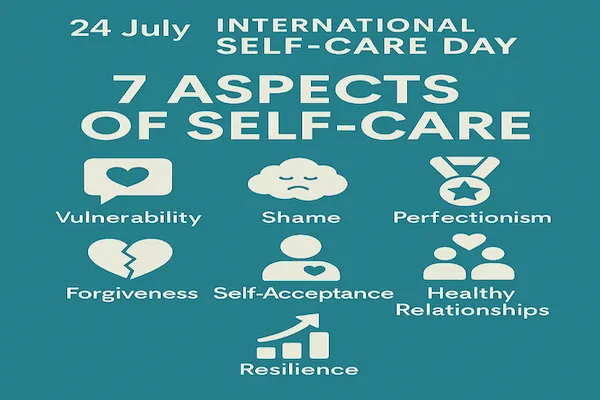
International Self-Care Day : 7 Deeper Dimensions of Self-Care
International Self-Care Day (24 July): 7 Deeper Dimensions of Self-Care
Each year, International Self-Care Day on 24 July reminds us that self-care isn’t just about physical health—it’s a holistic commitment to our mental, emotional, relational, and spiritual wellbeing. While rest, nutrition, and exercise are vital, real transformation often comes through addressing the inner landscape of how we think, feel, and relate to others.
Let’s explore seven powerful and often overlooked aspects of self-care—and why they matter for your wellbeing:
1. Vulnerability: The Courage to Be Seen
According to Dr Brené Brown, vulnerability is not weakness—it’s “the birthplace of courage, creativity and connection.” Practicing self-care means allowing yourself to be honest about your needs, feelings, and fears—especially in the workplace or relationships where masks often prevail. Vulnerability builds trust and invites authenticity.
📘 Resource: The Power of Vulnerability – Brené Brown (TED Talk)
2. Shame: Naming It to Diminish Its Power
Shame is a silent health hazard. It often tells us we’re “not enough” and keeps us isolated. Brown’s research reveals that shame resilience is a critical skill for wellbeing. Self-care involves recognising shame triggers and speaking about them safely—with a friend, therapist, or your P3 Business Partner.
📘 Resource: Mind – Understanding Feelings of Shame
3. Perfectionism: Letting Go of ‘Never Enough’
Perfectionism masquerades as a strength in high-pressure environments, but it often leads to anxiety, procrastination, and burnout. Real self-care involves allowing yourself to be “human,” not flawless. Progress, not perfection, is the goal.
📘 Resource: NHS – Mental Wellbeing Tips
4. Forgiveness: Setting Yourself (and Others) Free
Unforgiveness weighs heavily on the body and mind. Studies from Johns Hopkins University show that forgiveness lowers stress and blood pressure, and even improves heart health. Self-care sometimes means choosing to forgive—yourself or others—to create space for peace.
📘 Resource: Positive Pschology- Forgivess benefits
5. Self-Acceptance: Embracing Who You Are
Accepting yourself doesn’t mean giving up on growth—it means starting from a place of compassion. The Self-Acceptance Project from Sounds True reveals that unconditional self-worth is foundational to resilience and joy.
📘 Resource: Kristin Neff – Self-Compassion Resources
6. Healthy Relationships: The Power of Safe Connection
The Harvard Study of Adult Development—an 85-year longitudinal study—found that strong relationships are the key to happiness and long life. Cultivating honest, supportive relationships is self-care in action. Boundaries, mutual respect, and presence matter.
📘 Resource: Relate UK – Relationships Support
7. Resilience: Growing Through Challenge
Self-care isn’t about avoiding pain—it’s about recovering well. Resilience means learning from setbacks, staying grounded in hope, and reaching out when needed. The NHS and Mental Health Foundation both highlight resilience-building as vital to long-term wellbeing.
📘 Resource: Mental Health Foundation – Resilience Guide
Self-Care Is a Lifestyle, Not a Luxury
As International Self-Care Day approaches on 24 July, reflect not just on what you do to care for yourself, but on how you treat yourself. Incorporating these deeper practices of emotional and relational self-care can lead to greater peace, strength, and authenticity in every area of life.
Make 24/7 self-care more than a slogan—make it a sustainable, wholehearted way of living.